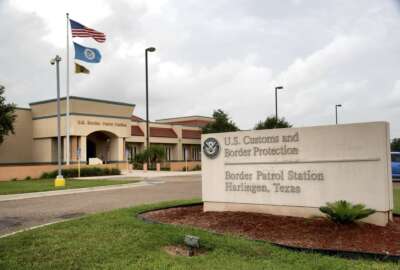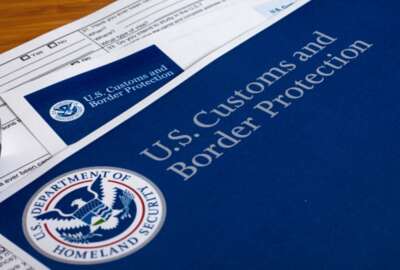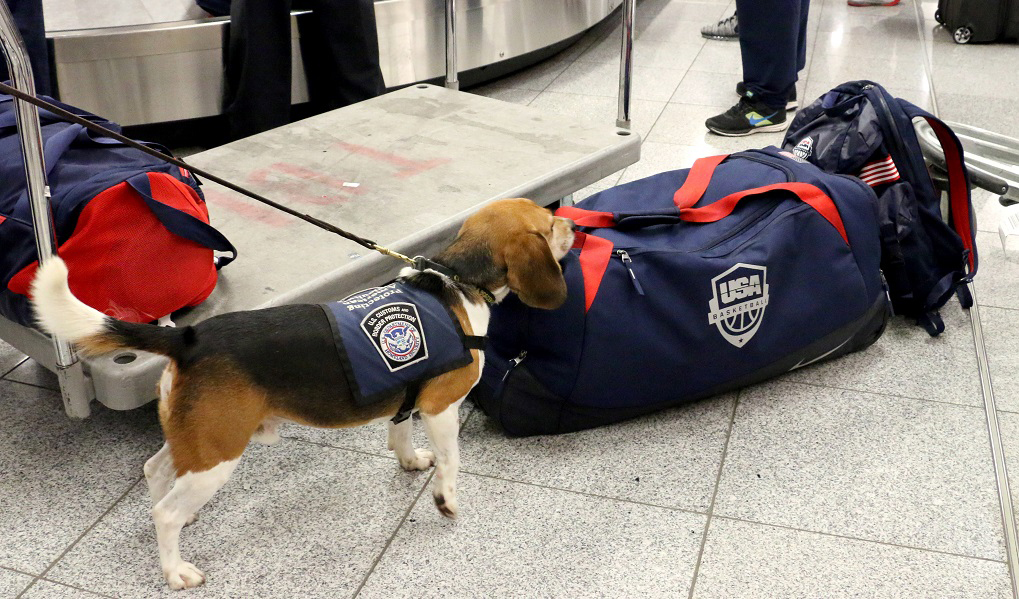Customs and Border Protection aims to improve training for brokers
As long as the United States has traded with other nations, customs brokers have been at the center of it. Now Customs and Border Protection (CBP) inaugurates new...
As long as the United States has traded with other nations, customs brokers have been at the center of it. Now Customs and Border Protection (CBP) inaugurates new continuing education for its brokers, as trade volumes and complexity grow. For the details, Federal Drive with Tom Temin spoke with John Leonard, the deputy executive assistant commissioner for CBP’s Office of Trade.
Interview Transcript:
Tom Temin And let’s begin with kind of something basic. Everyone knows the term custom broker. What do custom brokers actually do?
John Leonard Customs brokers are folks that have been around really for almost centuries. Since the beginning of our republic in 1789, the Customs Service was really one of the first agencies ever set up to help fund our young nation, kind of take down the Revolutionary War debt by collecting duties, etc., and promoting international trade. And customs brokers, basically folks that act on behalf of importers and help importers clear goods through customs is their function. I almost make it akin to almost like a tax preparer, if you will. But again, the work they do is of a different nature and a little bit more complex in certain respects. But they’re in business essentially to expedite freight into the United States on behalf of importers.
Tom Temin And how many brokers does CBP actually have?
John Leonard That’s an interesting point. We don’t employ them, they are private sector individuals. We license them and we regulate them. And we actually create the exam that they have to take to become a broker. But we don’t employ them, they’re in the private sector, and it’s just shy of 15,000 licensed brokers in the country. Many of them working for very recognizable names such as FedEx, UPS, DHL and larger freight forwarders and other brokers.
Tom Temin Interesting. OK. Well, I’ve learned something new here today myself, so good to have you on. And what types of people? What is the educational background? Are they accountants in general or are they lawyers or what are they? Or just people that really like this stuff.
John Leonard Really, all of the above. There are some baseline requirements in the law, and one of them is to be a citizen 21 years or older. They have to pass the customs broker license exam, which actually is one of the most challenging license exams in the professional space. We have a pass rate that generally is well below 50%, and that’s on purpose. We want it to be a very challenging exam that only people that are serious about becoming brokers are able to pass it. There’s a couple of other formalities, but they come from all kinds of backgrounds. Some of them from a legal or an international trade background, some of them are even our own folks that used to work for CBP. But basically they have a passion for international trade.
Tom Temin Got it. And are some of them self-employed? You mentioned a lot of the big companies well known, but can you be a self-employed broker and just freelance for small fry importers?
John Leonard Absolutely. A lot of this industry is what I call mom and pop family type of businesses where a daughter or a son will take over for their mother or their dad who owned the business. Many of them work in very niche parts of the industry where they’ll specialize in a certain type of commodity. They can be a mom and pop one family operation, or they can be a massive company like FedEx or UPS. But the one thing I wanted to mention, Tom, that I think would resonate with your listeners is pretty much everything that we work with, we deal with every day. Very likely was expedited or cleared into this country by a custom house broker. The car you’re driving in right now, if it was made overseas, which many of them are. The products that you use, the clothes you wear. Let’s face it, we don’t manufacture nearly as much stuff as we did 50 or 100 years ago. So much of the stuff we use every day made overseas. And so everything you deal with every day likely was expedited or cleared by a custom house broker into one of our seaports, airports, trucks from Canada, Mexico. Very dynamic environment.
Tom Temin We’re speaking with John Leonard. He’s deputy executive assistant commissioner for the Office of Trade at Customs and Border Protection. And like tax law or accounting law, is this an area of law that changes a lot?
John Leonard It is. International trade is an incredibly complex, dynamic environment where rules are changing, laws are changing regulations. It almost seems like a weekly basis. And so to keep these brokers, these folks that we regulate and we license up to speed, we decided in conjunction with the brokerage community and the private sector to enact this regulation whereby they must get continuing education requirements, much like many other professional licensing. Your medical profession, your real estate, your accounting. They all have to get some notion of continuing education credits. And so we’ve finally, in my opinion, overdue, brought this into the world of customs brokers.
Tom Temin Interesting. Has there been any kind of continuing education before that? Are you updating something or just inaugurating something brand new?
John Leonard No, actually, education for brokers has existed for many, many years. Classes that they themselves put on the private side, and training that CBP and other partner government agencies that have equities at the border have put on. But this is now the first time that we’ve actually made it a requirement in regulation whereby continuing to actually hold your license, you must get a certain number of hours in a certain amount of time. So, yeah, this is the formalization of a time.
Tom Temin Yeah, very similar to CPAs I guess in a lot of professions, medicine and well, you name it. And how did you develop the course requirements? What it is that CBP needs to know that people themselves know to be good brokers?
John Leonard Great question. So again, a lot of what we do in this space, in this part of CBP’s mission set, we do very much in conjunction with our private sector stakeholders. So in actually constructing the rule, we do a notice of proposed rulemaking. So we put that out, and there were many comments about it, how we want to do it, how many hours are required, what type of training it would be, what the accreditation regime would be, like this course is good or this one would not qualify. So it was a very collaborative process, and I think we were really pleased with this final rule. And I think that our broker stakeholders are actually all very happy with it as well.
Tom Temin And the coursework itself was developed by CBP? Or are there organizations that already teach brokers what they need to know, they developed it.
John Leonard Actually it’s both. On the private sector side and international trade, there’s a lot of organizations that give training, and let’s face it, especially since the pandemic and even before much of the training can be done online. So any reluctance when we were talking about this requirement, say 10 or 15 years ago, and folks like, oh, do I have to travel to get training and put in a lot of expense? We feel most, if not all, of this training can be accomplished free of charge and a lot of it online. Yet we still love the in-person stuff. We’d love to see them do in-person conferences and face-to-face training. We feel like that is really effective as well.
Tom Temin But CBP will not be delivering the training. You just make sure that it conforms to what it is the government feels people need to know in private organizations. Is there an association of brokers or do they have some kind of a professional trade group?
John Leonard There are. But let me just reiterate, CBP actually will be providing some of that training, not necessarily all of it, but we do quite a lot of training. Both on online, we do webinars, we do in-person trainings. But yes, we do offer that at the ports of entry, even here at headquarters. So yeah, we’ll contribute. They have a lot of private side training as well. So it’s a combination, I think. The one thing I will say is the CBP training, the government training generally will always be free. There are associations, Tom, for brokers as a national association, what we call the NCBFAA, the National Customs Brokers and Freight Forwarders Association. And then almost every port area has their own local association, whether it be New York, New Jersey, L.A., Long Beach or one in California or even Boston and other ports. They have their own groups that locally meet.
Tom Temin Right. I imagine the commodities that come in to different areas might be particular to that area. For example, maybe all the cars come in from the West coast, from Japan or something. Whereas, I don’t know, sugar, rice and rum comes in on the East Coast.
John Leonard Absolutely. Like you’d never know it, but Philadelphia is a massive port for fresh produce coming up from Central and South America. It’s just over time its become logistically and connections to to Route 95. Philly is a huge port for that. So there’s brokers in Philly that specialize in all the intricacies of fresh produce. When I was our port director out in San Francisco, I had a relationship with a broker in Reno, Nevada. His only niche was firearms. The guy knew everything about importing firearms, working with ATF, what forms he needed. He had a bunch of clients and that was his niche.
Tom Temin Fascinating stuff. And when does this training requirement become standard or when is it officialized? Let’s say.
John Leonard It will begin in calendar year 24, so in a few months time. Part of our regulation of brokers is done, what we call on a triennial based, there’s a three year basis. So what we required them to get 36 hours every three years. So the next triennial period begins in 24, and hopefully we’ll get it stood up in January. If we don’t, we’ll prorate it and it’ll have to get last. But generally, it’s going to be 36 hours every three years. And frankly, many of them get way, way more than that anyway. It’s not going to be a heavy lift.
Copyright © 2025 Federal News Network. All rights reserved. This website is not intended for users located within the European Economic Area.
Tom Temin is host of the Federal Drive and has been providing insight on federal technology and management issues for more than 30 years.
Follow @tteminWFED






